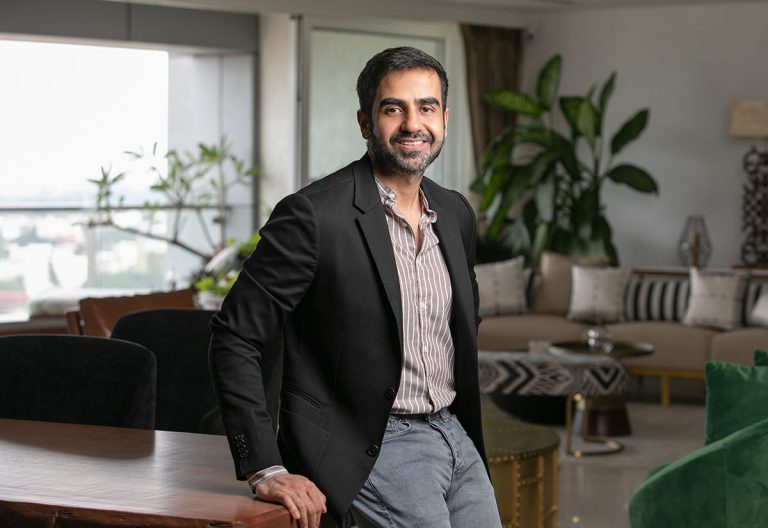At the age of 14, family and friends of Nikhil Kamath could have given him a billion reasons why it was the wrong time to turn his back on his education.
Almost 20 years later as he visits Dubai looking for partners for his latest venture, he can give them a billion reasons why it was a calculated risk that most definitely paid off.
The Bangalore-based serial entrepreneur has recently been named India’s youngest billionaire, having amassed his fortune in the financial sphere, originally as a trader, and more recently, working his magic in international asset management – a far cry from those early teenage years.
He told Arabian Business: “Back when I quit and I watched my classmates progress into college and into various professions, while I was still trying to figure out what my path should be on my own, it was a bit unnerving, both for me and my parents and my family I’m sure.”
Back then he harboured dreams of making it big in the world of chess. Having been introduced to the sport at the age of five, he honed his skills and developed into a talented player, so-much-so that he turned professional and took his skills across India, competing against the country’s very best players.
“Like many things in life, if you’re a little better at a certain sport or a certain vocation, I think you start liking it a lot more and doing it a lot more. I would say the same thing happened with chess. I played it for a few years and realised that I might be a bit better than the peers I used to play with at that time. I got a coach and trained and got better and competed on a bigger scale,” he said.
However, he confessed his talents didn’t quite reach the heights required in order to make a living from the sport and so, at the age of 17, it was back to the drawing board, in searching for his true vocation. This included working odd-jobs and time spent working in a call centre.
 Nikhil Kamath is India’s youngest billionaire
Nikhil Kamath is India’s youngest billionaire
With a keen interest in trading, he said he “stumbled” upon the stock markets, through his brother and his friends, who were already operating in that environment.
“The great thing about trading is there is no ceiling. If you’re a good trader you can buy a larger amount and if you’re continuing to make money you can scale and scale and scale. You’re not limited to many things and I think that was very attractive to me,” he said.
“Also the fact that a job in trading doesn’t require any minimum qualification. Anybody can study the financial markets, you can read up online, you can buy books about different systems and methodologies of trading and investing and become a good trader on your own,” he added.
That’s not to say he hit the jackpot overnight. Kamath admitted his path through trading, brokerages and asset management has been “riddled” with mistakes, but it was the lessons learned from these that placed him on the path to where he is today.
He said: “Much like any other trader, when I started off I made plenty of mistakes. I think the first three or four years of my trading profession were riddled with mistakes. All I did was make a little bit of money, make a mistake, lose that money and that cycle continued for a few years.
“A great teacher in the realm of trading is experience. I think nothing teaches you to be a better trader than losing money. In hindsight, when I think back to that time, I think those have been the biggest lessons of my life.
“There is no college that will teach you how to trade than actually experiencing these ups and downs and emotions you might have had as you start off with trading.”
Fortunately, many of the strategies learned on the chess board, remained true to his new profession.
He explained: “It teaches you a lot, especially in your trading career or in different things you might do in life. More about the importance of following a framework and having rules and systems in place, within which you have to operate. I think that could also be the key to trading because in trading there are a bunch of rules you can’t break; there are cardinal rules which you break over a long period, say 10 or 20 years, if a certain rule is not being followed, that one instance can cause significant damage to your portfolio.
“Chess has certainly helped in understanding the importance of being disciplined and working within that framework.”
Kamath built Zerodha without any external investing, which is today India’s largest retail brokerage with a daily turnover of $10 billion and is wholly owned by himself and his brother.
He also launched True Beacon last year, an asset management company for UHNWIs, which has outperformed the NIFTY 50 by 39 percent, despite market volatility.
“It’s very exciting. We are changing the ecosystem which has not really evolved much over the last decade or two. We’re trying to make it a more efficient, a more transparent asset management company, where we bring great people together from across the world,” he said.
Very exciting indeed. He expects the company to hit the billion dollar level “within a year or two”.
He has also launched many successful fintech businesses through his incubator Rainmatter, which have gone on to become disruptive outfits in their own right, such as SmallCase and Sensibull.
He was in Dubai to find partners for the recently launched True Beacon International, a category-I FPI firm, based in Mauritius, which will serve global ultra-high net worth and high net worth individuals looking to participate in, and contribute to, India’s growth story.
Kamath explained: “India has always had very close ties to this region, it almost feels like a second home when you’re here because even your taxi driver is talking to you in Hindi.
“The Indian diaspora, the NRIs, people who have origins in India are definitely a natural lateral for us to have, but outside of them I think we’re strongly looking at the people who are native to here, the Emiratis, people from Saudi, people who have traditionally been in oil-related businesses or real estate in Dubai.
“I think there is a lot of appetite here to invest in India and diversify their own portfolios and we intend to be the best partners for them in allow for them to do that in an efficient manner.”
So did he always have ambitions to be a billionaire?
“Absolutely not,” he said. “There are very many extremely intelligent, smarter, more hard-working people in the world out there. The people who get to become billionaires and come on these lists I think get lucky at various times in life. They are in the right industry at the right time, just before an inflection point, there is some kind of event or a bunch of events which allows for them to scale to that point.”
And is he planning to retire any time soon?
“I really enjoy it for now. I am happier for going into work every day and doing this, versus sitting at home or by a beach or a mountain somewhere and not do anything. I don’t think that will change for the foreseeable future.
“For at least the next five years or the next decade I definitely see myself doing things similar to what I’m doing today.”
To be fair, he probably has a billion more reasons why he wants to keep on going.
Five things we learned:
- Nikhil Kamath is India’s youngest billionaire
- He was once a professional chess player and competed across India
- Kamath owns India’s largest retail brokerage with daily turnover of $10bn
- He says Dubai is like a second home to him
- He has no plans to retire yet








